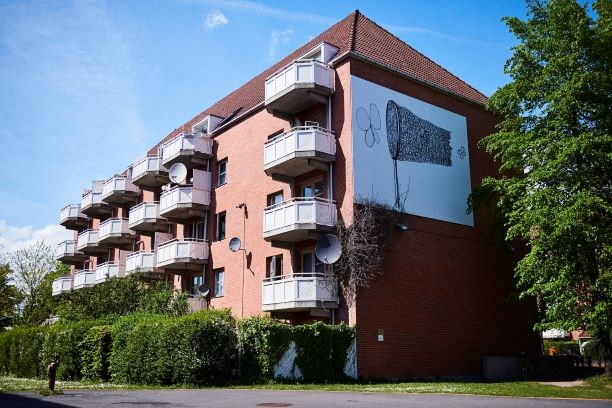While EU and the rest of the world is struggling to cope with the COVID pandemic, Denmark is planning to evict immigrants from troubled neighbourhoods in the country.
Residents in Copenhagen filed a lawsuit last week (27 May) against the Danish government seeking a declaration that measures under the country’s so-called “Ghetto Package” are unlawful under EU law and the European Convention on Human Rights.
The package, introduced in March 2018 by the former centre-right government, required immigrants to comply with certain conditions in order to receive social assistance. It also includes a plan to reduce social housing in vulnerable “ghettos” with socio-economic problems to 40% by 2030.
The plan was approved by the Danish Ministry of Transport and Housing in September 2019 after elections which brought the social-democratic party to power.
In Copenhagen’s Mjölnerparken, the government has earmarked over 200 apartments for sale. Thousands of others face eviction under similar plans across Denmark, at a time when the UN Special Rapporteur on Adequate Housing has pointed out that the COVID-19 crisis has laid bare inequalities in housing.
Non-Western background
What upsets the residents in Mjölnerparken is that the government has classified their neighbourhood as a “ghetto” because it has 50 % or more residents of “non-Western” background, thereby discriminating immigrants with other background.
“Denmark enjoys a reputation around the world as an egalitarian country with strong social and economic systems. These concepts are eroded by the ‘Ghetto Package’ and this eviction plan,” said Susheela Math of the Open Society Justice Initiative, which together with Danish partners is supporting the residents against the Danish state.
“Not only are these residents stigmatised as inhabitants of a ‘ghetto’ – with all its negative connotations – they are also facing losing their homes. The centrepiece of the law is a state-made label of ‘non-Western background,’ which can apply even to individuals born and raised in Denmark.”
The stated aim of the legislation, under which the development plan was made, is the eradication of “ghettos” by 2030. This is based on a concept of “parallel societies” according to socio-economic factors defined by the Danish government. The purpose of the new law is also to promote integration of immigrants.
"At the least, integrative efforts should be consultative and not coercive or punitive. This is in line with recent recommendations by the United Nations Committee on Economic, Social and Cultural Rights in its concluding observations on Denmark," Susheela Math said to The Brussels Times.
She added that it is unclear where the residents will be offered alternative housing or how much rent they will have to pay.
Following the evictions, the government also plans to gentrify the areas concerned. The reduction of social housing in the areas will enable the development of private housing and property management.
"Official statistics show that over 80% of the residents of Mjölnerparken are of so-called ‘non-Western’ background which also includes descendants,” says Jamila Versi, coordinator of the local network Almen Modstand.
Have the authorities entered into a dialogue with the residents?
"No, they haven’t communicated with the residents,” she replied. “In fact, the tenants in Mjölnerparken drafted an alternative development plan which was ignored. The tenants’ association then voted against the development plan suggested by the housing company and the commune. However, their votes were also ignored.”
Non-voluntary move
Would people, irrespective of background, be willing to move out from the neighbourhood if it was voluntary and applied to all residents without discrimination?
"The important thing to understand here is that the residents don’t want to move from their homes and the only reason that they are under threat of eviction is because of the 40% requirement, which in turn is based on the state-made and arbitrary classification of ‘non-Western’ background."
Another resident, Susanne Poulsen, said, "We all value our home. In Mjölnerparken, where I live, we value our community and respect each other. We greet each other with a smile and a sparkle in our eyes. A home is a human right. This isn't only a threat to us, but also to our children."
The case was filed in the Copenhagen District Court and calls for a ruling that the development plan is unlawful under Danish law, EU law and the European Convention on Human Rights. In case domestic remedies are exhausted, next step will be to take the case to the European Court of Human Rights.
Kaare Dybvad Bek, the Danish housing minister, comments that it is a small group of 12 people out of 1900 residents in the neighbourhood that have chosen to take legal action against the plan. “Of course, it's their right,” he said in Danish media. “I disagree with their claim so the courts will have to decide on it.”
“The overall ambition we have behind the legislation is to ensure mixed residential areas where you meet each other across social and ethnic divides, and where the children who grow up in Mjölnerparken and similar neighbourhoods have the same opportunities as everyone else in Copenhagen,” he added.
The issue at stake is how far a government can go in enforcing integration of immigrants.
M. Apelblat
The Brussels Times

